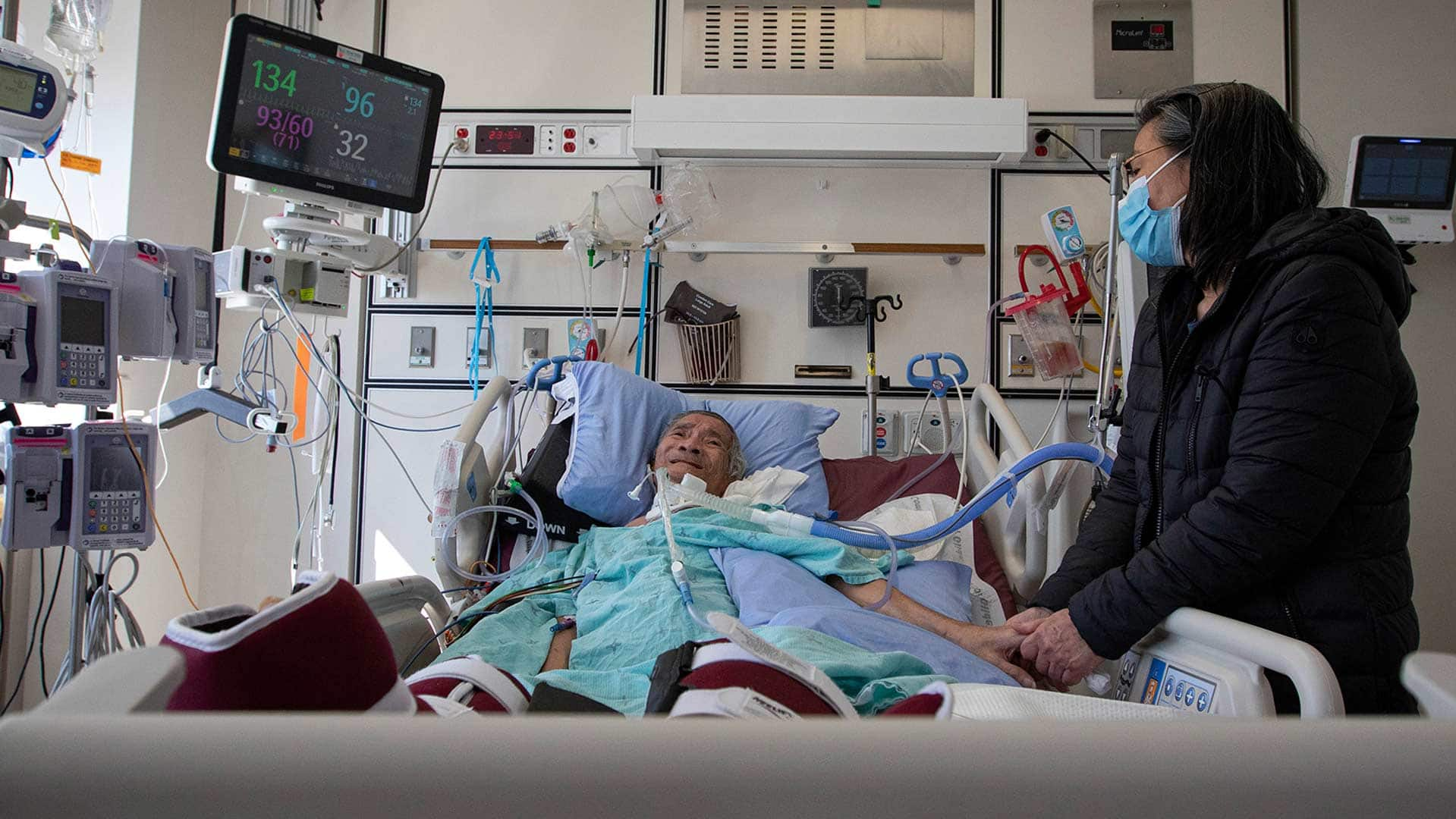Top medical experts call for national inquiry into Canada’s COVID-19 ‘failures’

Three and a half years after the virus behind COVID-19 began its rampage around the world — eventually killing tens of thousands of Canadians — a group of top medical experts is calling on federal officials to launch a full national inquiry into Canada’s pandemic response.
In a sweeping set of editorials and analysis papers published on Monday in the British Medical Journal (BMJ), more than a dozen physicians and health advocates are shining a spotlight on what they’ve dubbed the country’s “major pandemic failures,” from the devastation in long-term care homes, to vaccine hoarding, to higher death rates among lower-income communities.
Those shortcomings all played out against the backdrop of the country’s complex, fragmented health-care system. That decentralized approach, the authors argue, led to dramatic differences in how each province handled the spread of SARS-CoV-2, the virus first reported in Canada in Jan. 2020.
When compared with the “shambolic” U.K. response and the “chaos and divisiveness” of the U.S., Canada appeared to rise to the occasion when COVID hit, wrote several authors in an introductory editorial, including Jocalyn Clark, a Canadian public health scientist who is currently the BMJ’s international editor. Yet the reality, the papers explain, remains far more nuanced, with the full scope of successes and failures still unclear.
“We wouldn’t know because no pandemic inquiry has been established by its federal government,” the group continued. “This is a mistake.”
The most important reason for an inquiry, the group stated, is accountability for the losses of the pandemic, after more than 50,000 direct deaths, millions of additional infections that “devastated families” across Canada, and a lasting legacy of Long COVID patients.
“If this global catastrophe doesn’t cause the need for a deep examination… I don’t know what will,” Clark told CBC News.
“I hope the authorities don’t just sweep it under the carpet.”
More patients are fighting for their lives in Ontario ICUs than at any previous point in the pandemic. CBC News goes inside Toronto’s Scarborough Health Network to see the impact.
Federal officials remain ‘committed to a review’
Federal officials told CBC News they remain “committed to a review of the response to COVID-19 in order to take stock of lessons learned and to better inform preparations and responses to future health emergencies,” according to a statement provided by the office of Health Minister Jean-Yves Duclos.
Health Canada also noted there are a number of audits and studies already underway, including the launch of an independent public health review panel and a series of comprehensive audits on the agency’s pandemic response undertaken by the Office of the Auditor General.
“But they’re not comprehensive,” Clark, from the BMJ, said in a video call with CBC News. “They almost seem to exist as a patchwork quilt.”
The country’s previous health minister, Patty Hajdu, spoke about the possibility of a broader approach back in 2021.
“We are open to an inquiry that is as deep as necessary, including a public inquiry, that gets to how our country can be better prepared [for] global health threats in the future,” Hajdu said in April that year, adding the government would consider examining its COVID response “when the time is right.”
That time is now, Clark said. “What we need is something at the federal level that’s properly legislated and governed,” she continued, “so that we’re doing a full comprehensive public inquiry that looks at the full pandemic response.”
Dr. David Naylor, whose 234-page report on the SARS crisis of 2003 outlined “squabbling among jurisdictions” and “dysfunctional relationships among public health officials” — and led to the creation of the Public Health Agency of Canada a year later — agreed some form of analysis is warranted.

The U.K. has already launched a COVID inquiry, including six weeks of hearings, a style which Naylor warned runs the risk of becoming a “drawn-out affair with a focus on finger-pointing and lots of political theatre.”
What makes more sense, he said in an email to CBC News, is a multidisciplinary review panel including both experts and Canadians from other walks of life, and chaired by an independent, international voice.
“The least our leaders can do is honour the memories of those we lost, and the sacrifices and commitments of those still living, by giving Canadians a comprehensive and honest account of what went wrong, what went right, and what will be done to ensure that we are better prepared for the next infectious threat,” he wrote.
To fill that void, Clark and other authors offered their own assessments.
On the positive side, research suggests the country fared well in the first two years, with lower SARS-CoV-2 infections and deaths, coupled with higher vaccination coverage, than most other industrialized G10 countries, the authors wrote.
But their list of shortcomings in Canada’s pandemic response was far longer.

Efforts to contain COVID were hampered by inconsistency in decision making and inadequate data sharing, one BMJ paper noted, while another highlighted early funding gaps that neglected outbreak hotspots such as long-term care, housing shelters, and essential workplaces.
“The picture that emerges is an ill prepared country with outdated data systems, poor coordination and cohesion, and blindness about its citizens’ diverse needs. What saved Canada was a largely willing and conforming populace that withstood stringent public health measures and achieved among the world’s highest levels of vaccination coverage,” the BMJ authors wrote in their opening editorial.
“In other words, Canadians delivered on the pandemic response while its governments faltered.”
‘We weren’t closing the gaps’
The latest available federal data shows more than nine in 10 reported COVID deaths throughout the pandemic were among Canadians aged 60 and up, with the highest death toll among seniors over the age of 80.
Long-term care, in particular, became a death trap, in what the BMJ team called a “predictable” crisis.
“A particular disgrace is Canada being at the top of wealthy nations for [COVID-related] deaths in care homes for older people, despite more than 100 reports foreshadowing a nursing home crisis,” the authors wrote.
Residents of care homes accounted for three per cent of COVID cases in Canada by the end of 2021, but made up roughly 43 per cent of deaths. And even though long-term care residents were prioritized in the country’s vaccination programs, homes experienced more outbreaks in 2022 than in either of the previous years of the pandemic.
Winnipeg resident Eddie Calisto-Tavares, whose father died during a COVID outbreak at a long-term care home, described the scene inside the home in the days before her father’s death as a “nightmare,” with residents calling for help, few staff left to check on them, and people eventually being found dead by paramedics. Her fear now, she said, is that history will repeat itself should another crisis hit.
A series of new reports in the British Medical Journal say Canada was ‘ill-prepared’ and ‘lacked co-ordination’ in the COVID-19 pandemic. The report authors say it is time to investigate what happened and learn how to prepare for the next pandemic.
“When you don’t learn from your mistakes, you’re doomed to repeat them,” echoed Toronto geriatrician Dr. Samir Sinha, who was not involved in the BMJ series. Long-term care homes still have major staffing issues, he added, while rooms are still being built to house more than one resident at a time despite the risks of virus transmission.
“While we felt bad for older Canadians, we didn’t always learn to step up and do what we knew we could have done,” Sinha said.
The BMJ authors also stressed that, overall, the highest rates of SARS-CoV-2 cases and deaths were among racialized groups, recent immigrants, lower-wage essential workers, and individuals living in crowded, multigenerational households.
The latest Ontario data paints a particularly stark picture: The income gap in COVID-19 outcomes didn’t improve over time, with an updated analysis led by a Toronto research team showing rates of hospital admissions and deaths remained threefold higher in the lowest versus highest income neighbourhoods — through seven waves of infections up to the fall of 2022.
That trend played out even as the province ramped up vaccine coverage, several authors continued, and while the population developed more hybrid protection through prior infections and vaccination.
“We weren’t closing the gaps, and by then, really we should have,” said Dr. Sharmistha Mishra, an infectious disease epidemiologist at the University of Toronto and Unity Health.
Governments still need to push for workplace improvements to address those systemic issues, she argued, including adequate sick days, strategies to reach communities with lower incomes and higher population densities, and ensuring vaccine equity.
The country also experienced multiple large, often deadly outbreaks among essential workers, including hundreds of infections at one Brampton, Ont., Amazon warehouse in 2021 and one of the continent’s largest outbreaks at an Alberta meat-packing plant the year before, which was linked to more than 1,500 cases and at least two deaths.
Concerns over vaccine hoarding, distribution
Vaccination approaches in Canada were a mixed bag, with the country hitting high overall vaccination targets — eight in 10 Canadians have finished their initial vaccine series — while critics warned shots weren’t always making it to the hardest-hit communities throughout the pandemic.
The BMJ team praised some provinces’ efforts to develop hot-spot vaccination strategies, but said advisory group reports often came out too late. The first federal report on COVID inequalities, the authors noted, came out 10 months into the pandemic.
The researchers also dug into Canada’s role to deliver vaccines on the global stage, including the federal government’s heavily criticized decision to receive doses from the global initiative known as COVAX while also gobbling up shots through other outside deals.

“By the end of 2022, Canada had administered almost 96 million doses while delivering fewer than 29 million abroad. This poor performance on sharing doses when they were most needed resulted in domestic oversupply, with tens of millions facing expiry by late 2022,” outlined one BMJ paper.
“Meanwhile, over two years after vaccination began in Canada, not a single dose had been manufactured domestically, a shortcoming that directly affected the government’s actions both at home and abroad regarding measures to increase vaccine supply.”
By making extensive bilateral deals with drug companies, Canada and other high-income countries claimed most of the available vaccines and pushed COVAX — and by extension low- and middle-income countries — to the back of the queue for receiving vaccines, the paper continued.
“A million lives in 2021 alone might have been saved in poorer countries had rich nations such as Canada shared more [doses],” the authors wrote.
It all played out against what the BMJ team described as a health-care system that remains fragmented, decentralized, and complex — which provided “different rules in different places” throughout the pandemic based on unclear rationale.
While federal bodies offered vaccination guidance, each province or territory then created separate eligibility plans and mandates. “For example, vaccine mandates in Ontario applied only to those working in long term care homes while in New Brunswick, Newfoundland, Nova Scotia, and Yukon vaccines were required for those working in healthcare, the public sector, long term care, and schools,” one analysis noted.
Provincial public health authorities also differed in their guidance on masks, school closures, curfews and lockdowns, while various levels of government tackled outbreak management.
“The authors are very concerned that some of their findings — about missed opportunities for leadership or coordination, and a lack of sharing of data across systems — that these were some of the flaws that were identified during the Canadian response to the SARS outbreak,” Clark told CBC News, referring to Naylor’s 2003 report.
A COVID-19 outbreak at an Alberta slaughterhouse claimed three lives. A year later, at another plant, it happened again. Find out why as CBC speaks to affected workers, who we have agreed to not name as they fear it could impact their jobs.
‘This is going to require transformative change’
Throughout the BMJ papers, and in CBC News conversations with outside medical experts, a central theme that emerged was a desire for this country to avoid the mistakes of the last few years — though few seemed hopeful.
“If we were to have another pandemic that would start tomorrow,” Sinha said, “it would really be Groundhog Day again.”
Dr. Sharon Straus, physician-in-chief at St. Michael’s Hospital in Toronto and one of the main authors of several papers in the BMJ series, warned that without a full federal inquiry, various political actors may step into that vacuum and create more divisiveness across the country.
What the BMJ authors want to see, she added, is an inquiry that actually gets implemented, including new national standards that could reduce the fractured nature of Canadian healthcare and better prepare the country for the possibility of another pandemic.
“This is going to require transformative change,” she said, along with “unprecedented collaboration between the federal government and provincial and territorial governments.”
But Clark acknowledged that given Canada’s mixed performance during COVID — even after a scathing report on how the country handled SARS — there’s a growing sense that mistakes may be repeated whenever another public health threat hits.
“It’s really depressing that all of us expect people to shrug our shoulders when we have a crisis of this magnitude and scale,” she said.






